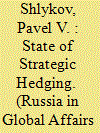| Srl | Item |
| 1 |
ID:
174950


|
|
|
|
|
| Summary/Abstract |
When Aleksei Kosygin visited Turkey in 1975 for the inaugural firing of a massive Soviet-built steelworks, he laid out an ideologically charged vision of development: “unlike the Americans with their Coca-Cola factories, we contribute to industrialization.”1 The Soviet chairman of the council of ministers picked an unusual audience for his disparagement of the United States. Even though Washington had recently imposed an arms embargo in response to Ankara’s intervention on Cyprus, Turkey was still a NATO member. More to the point, Turkey had been a key recipient of U.S. aid since the beginning of the Cold War.2 The Soviet Union could not truly compete with the Western investments that included a Coca-Cola plant which opened in Istanbul in 1964, but Moscow nevertheless committed extensive resources to industrial sites in Anatolia in the 1960s and 1970s. Given that Turkey was closer to the Transatlantic Alliance than the Non-Aligned Movement, the Soviet challenge to U.S.-led modernization in Turkey is an unusual and thus revealing place to find what looks like Cold War competition to develop the Global South.
|
|
|
|
|
|
|
|
|
|
|
|
|
|
|
|
| 2 |
ID:
192486


|
|
|
|
|
| Summary/Abstract |
This article analyzes the multidimensional nature of Turkey’s foreign
policy and its relations with Russia in the 2010s and the early 2020s
through the prism of strategic hedging concept. Previously, many scholars
pointed to mostly different elements of balancing in Ankara’s foreign
policy behavior. However, since the late 2010s, Turkey has systematically
positioned itself as a power aspiring for significant strategic autonomy
in international affairs, for which reason researchers had to look for new
analytical approaches to describe its behavior in the international arena and relations with its neighbors. The concept of strategic hedging allows
analyzing more accurately Turkey’s multidirectional foreign policy, which
does not correspond with the classical models of behavior typical of middle
powers, especially those engaged in military-political alliances with the
United States. The article argues that due to a complex of international
and domestic reasons Turkey has been trying to combine different types of
balancing and, more importantly, hedging. This strategy enables Turkey not
only to retain but also to enhance its strategic autonomy in international
relations. In this strategy Russia has become an important source of Turkey’s
strategic autonomy while the crisis in Ukraine, with all its negative impact
on Turkey, has opened up new opportunities.
|
|
|
|
|
|
|
|
|
|
|
|
|
|
|
|